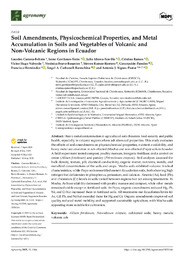Resumen :
Heavy metal contamination in agricultural soils threatens food security and public health, especially in volcanic regions where ash alters soil properties. This study evaluates the effects of soil amendments on physicochemical properties, nutrient availability, and heavy metal accumulation in ash-affected (Mocha) and non-affected (Puyo) soils in Ecuador. A field experiment tested compost, poultry manure, inorganic fertilizer, and a control on onion (Allium fistulosum) and parsley (Petroselinum crispum). Soil analyses assessed the bulk density, texture, pH, electrical conductivity, organic matter, nutrients, metals, and metalloid concentrations of the soils and crops. Mocha soils exhibited volcanic Andisol characteristics, while Puyo soils resembled eastern Ecuadorian soils, both showing high nitrogen but deficiencies in phosphorus, potassium, and calcium. Arsenic (As), lead (Pb), and chromium (Cr) levels in soils varied between regions but not among treatments. In Mocha, As bioavailability decreased with poultry manure and compost, while other metals remained stable except in fertilized soils. In Puyo, organic amendments reduced Hg, Pb, Ni, and Cr but increased them in fertilized soils. All treatments met Ecuadorian limits for As, Cd, Pb, and Ni but exceeded those for Hg and Cr. Organic amendments improved soil quality, reduced metal mobility, and supported sustainable agriculture, with Mocha soils appearing more suitable for cultivation
|
 La licencia se describe como: Atribución-NonComercial-NoDerivada 4.0 Internacional.
La licencia se describe como: Atribución-NonComercial-NoDerivada 4.0 Internacional.
.png)
